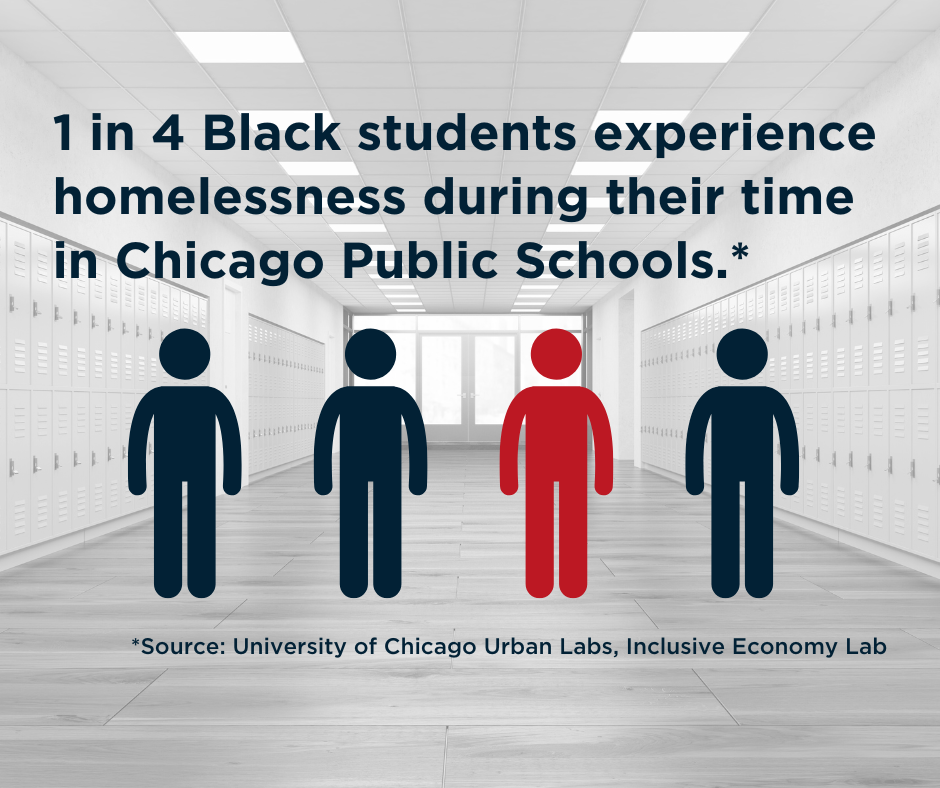Racial Disparities in Education Tied to Homelessness
 A disproportionate percentage of Black students in the Chicago Public Schools experience homelessness.
A disproportionate percentage of Black students in the Chicago Public Schools experience homelessness. Black students enrolled in Chicago Public Schools are at greater risk of being unhoused than their white and Hispanic classmates, with a one in four chance of experiencing homelessness during their time in the school system.[1] Students who are unhoused and identify as Black face an intersecting web of barriers that make it especially hard to get an education, which increases the risk of remaining or reentering homelessness as an adult.
"Students who are homeless face challenges enrolling in school, attending on a regular basis, and participating fully in school activities," explained Barbara Duffield, Executive Director of SchoolHouse Connection. "They aren't getting their basic needs met so it is harder to put energy into their studies or get support."
As a result, unhoused students grapple with lower attendance rates, gaps in enrollment, decreases in their GPAs, and, among high school students, a lower likelihood of graduating. Lack of a high school education or a GED has been identified as the single greatest risk factor associated with youth homelessness.
To compound matters, Black students in Chicago are most often already at a disadvantage in public schools. According to the Metropolitan Planning Council, just under 80% of Chicago public schools are majority Black or Latino, and these mainly serve low-income students.[2] Schools in low-income areas receive less funding, and their students have fewer educational resources and larger class sizes among other limitations.[3]
Whether housed or unhoused, Black students also face higher rates of expulsion or suspension and a lower likelihood of being placed in a gifted program because of racial bias.[4] They also are more likely to face additional challenges that come with poverty.
"Black students move more than most because of housing instability and struggle with catching up even with lots of support from school staff," said Allison McCann-Stevenson, Assistant Director of Long-Term Residential Services at The Night Ministry. "Lack of resources, clothing, food, transportation plus housing for the entire family makes for bigger hurdles for Black students to overcome."
Despite these disparities, experts believe that the role education plays in homelessness is often overlooked.
"Education gets marginalized in conversations about homelessness as a support system and as a key part of getting out of homelessness," said Duffield. "We're not going to solve homelessness in Chicago or the nation unless education is brought into the conversation fully."
[1] https://urbanlabs.uchicago.edu/attachments/2b784ae5f9d450e3e1496ee377dab30c129fe659/store/1b887d90ec3bf6d86e9ba1205b34c335bfae7e00893d9c1d89d392bca006/Known%2C+Valued%2C+Inspired_2021-08-04.pdf
[2] https://www.metroplanning.org/news/7395/The-persistent-problem-of-segregation-in-Chicagos-public-schools
[3] https://www.ncbi.nlm.nih.gov/books/NBK223640/
[4] https://www.apa.org/monitor/2016/11/cover-inequality-school
Want to read more stories like this? Be sure to join our email community!